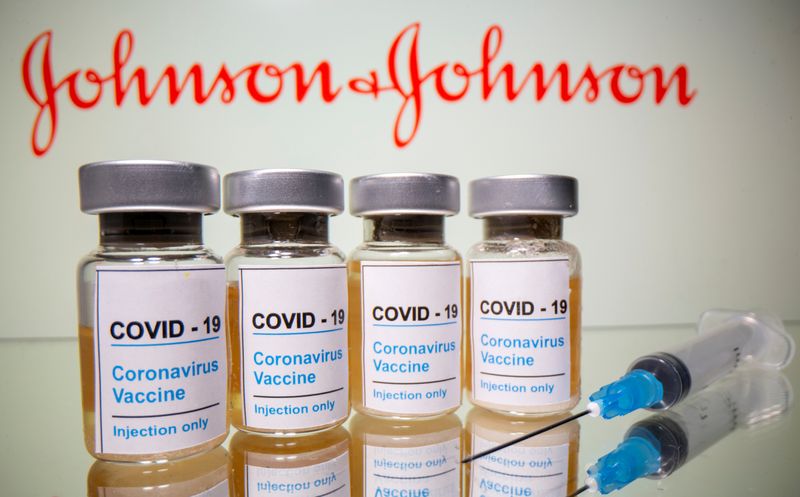CHICAGO/FRANKFURT (Reuters) – Johnson & Johnson’s chief scientist said the company expects to produce up to 3 billion doses of its COVID-19 vaccine next year, after the European Union approved the one-shot immunization on Thursday.
The company is bringing on three manufacturing plants to produce the key drug substance. It also will have seven plants globally that will handle final production steps and bottling into vials known as fill and finish.
“All these will function together to deliver the 1 billion by the end of the year,” Dr. Paul Stoffels, J&J’s chief scientific officer, said in an interview.
“Next year, we can do more than two billion vaccines, and even up to three if we maximize capacity. With Merck on board, we will be north of 2 billion,” he added, referring to a recent agreement for rival Merck & Co to produce J&J’s vaccine.
Stoffels also said he was confident J&J will be able to deliver a planned 55 million doses to the European Union in the second quarter. An EU official told Reuters this week that J&J had flagged possible supply issues that may complicate these plans.
“We trust that we can deliver close to that amount in Q2,” Stoffels said, adding that final production steps would be the biggest challenge.
“It’s the fill and finish which was the critical part and there we learned we had later access, we started later and had later access to facilities,” he said.
J&J’s shot is the fourth to be endorsed for use in the EU after vaccines from Pfizer/BioNTech, AstraZeneca Plc and Moderna Inc.
Europe is scrambling to get immunization campaigns off the ground after an early supply shortfall from Pfizer, since resolved, and more persistent issues with AstraZeneca.
J&J’s vaccine is expected to be used widely around the globe because of its one-shot convenience and logistical advantage of being shipped and stored at normal refrigerator temperatures. Both the Pfizer/BioNTech and Moderna vaccines require two doses and must be shipped frozen.
Thursday’s approval included authorization in Europe of Maryland-based Emergent Biosolutions Inc, which is making active drug substance for the vaccine.
“Emergent is a very critical supplier. It’s important for both the U.S. and Europe and other parts of the world,” Stoffels said, adding it can deliver enough drug substance for “up to a billion vaccines a year.”
Stoffels said in the United States, the company was only allowed to seek emergency use authorization for one manufacturing plant to produce drug substance.
Initial U.S. doses are being made at the company’s plant in Leiden, the Netherlands. J&J is awaiting U.S. approvals of the Emergent plant for drug substance, and for Catalent Inc, a contract manufacturer that will handle fill and finish from a new manufacturing line in Bloomington, Indiana.
Stoffels said as soon as J&J received U.S. authorization for the vaccine, U.S. regulators started reviewing the company’s additional production plants.
He said early “hiccups” have been resolved and the company expects to deliver on its promise of 100 million doses before the end of June.
In Europe, Stoffels said the company plans to significantly scale up production of its Leiden plant. Additional capacity will come on board likely over the summer, he added.
Indian drugmaker Biological E Ltd will handle both drug substance and fill and finish for J&J’s vaccine. The company’s managing director told Reuters last month that Biological E was looking to contract manufacture roughly 600 million doses ofJ&J’s COVID-19 vaccine a year.
Biological E is in the process of installing and validating equipment in the plant, which Stoffels said he expects to be ready in the second half of this year.
(Reporting by Julie Steenhuysen in Chicago and Ludwig Burger in Frankfurt; Editing by Peter Henderson and Bill Berkrot)

























